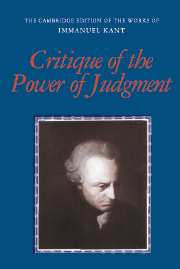Book contents
- Frontmatter
- Contents
- General editors' preface
- Editor's introduction
- First Introduction to the Critique of the Power of Judgment
- Critique of the Power of Judgment
- Preface
- Introduction
- First Part: Critique of the Aesthetic Power of Judgment
- Second Part: Critique of the Teleological Power of Judgment
- Appendix: Methodology of the Teleological Power of Judgment
- Method of citation and abbreviations
- Editorial notes
- Glossary
- Index
Introduction
Published online by Cambridge University Press: 05 April 2013
- Frontmatter
- Contents
- General editors' preface
- Editor's introduction
- First Introduction to the Critique of the Power of Judgment
- Critique of the Power of Judgment
- Preface
- Introduction
- First Part: Critique of the Aesthetic Power of Judgment
- Second Part: Critique of the Teleological Power of Judgment
- Appendix: Methodology of the Teleological Power of Judgment
- Method of citation and abbreviations
- Editorial notes
- Glossary
- Index
Summary
On the division of philosophy.
If one divides philosophy, insofar as it contains principles of rational cognition of things by means of concepts (not merely, like logic, principles of the form of thinking in general a without distinction of objects), into theoretical and practical, as is customary, then one proceeds entirely correctly. But then the concepts that refer the principles of this rational cognition to its object must also be specifically distinct, since otherwise they would not justify any division, which always presupposes an opposition between the principles of the rational cognition belonging to the different parts of a science.
There are, however, only two sorts of concepts that allow an equal number of distinct principles of the possibility of their objects: namely the concepts of nature and the concept of freedom. Now since the former make possible a theoretical cognition of nature in accordance with a priori principles, but the latter includes within its concept in that regard only a negative principle (of mere opposition), while on the contrary it attains ampliative principles for the determination of the will, which on that account are called practical: thus philosophy is justifiably divided into two parts, entirely distinct as far as their principles are concerned, namely, the theoretical, as philosophy of nature, and the practical, as moral philosophy (for thus is the practical legislation of reason in accordance with the concept of freedom named).
- Type
- Chapter
- Information
- Critique of the Power of Judgment , pp. 59 - 86Publisher: Cambridge University PressPrint publication year: 2000

